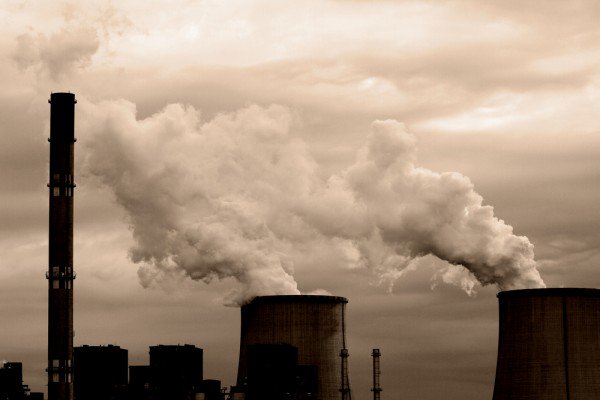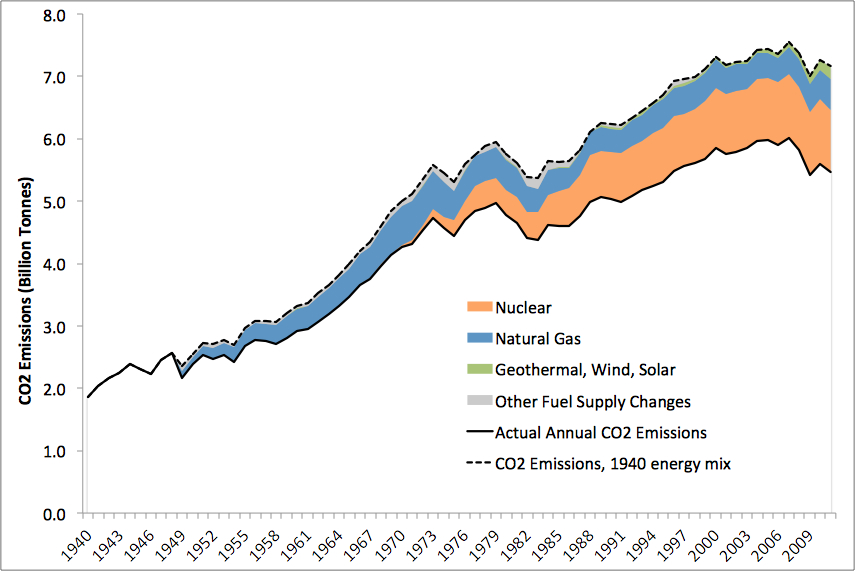54 Billion Tons of CO2 Emissions Displaced By Nuclear Energy and Natural Gas

 Credit: Nneirda / Shutterstock.com
Credit: Nneirda / Shutterstock.com
According to a new analysis by the Breakthrough Institute, energy produced by nuclear fission and natural gas has saved the country 54 billion tons of carbon dioxide emissions since 1950. Had America’s carbon intensity remained constant at its 1940 levels, today’s annual carbon dioxide emissions would be approximately 1.7 billion tons greater.
In the 1950s, natural gas saw increased popularity, reducing carbon emissions by replacing coal. In the 1970s, nuclear power - which emits no carbon - began expanding as one of the nation’s energy suppliers. In the 1990s renewable geothermal, wind, and solar energy started supplying significant shares of energy.
Though geothermal, wind and solar power had a relatively modest impact on emissions reductions, accounting for 1.5 billion tons over the 60-year period, the switch from dirty energy to nuclear power accounted for half of the total emissions reductions, or 28.1 billion tons over the 60-year period. Similarly, the switch to natural gas accounted for a reduction of 25.9 billion tons.
Credit: Breakthrough Institute (click to enlarge)A paper authored by NASA scientists James Hansen and Pushker Kharecha found that nuclear power could prevent “80–240 emissions due to fossil fuels by midcentury, depending on which fuel it replaces.”
Additionally, Hansen and Kharecha found that nuclear energy prevented an average of 420 000–7.04 million deaths. In fact, scientists estimate that, had the world’s nuclear power been replaced by the burning of coal and natural gas between the years of 1979 and 2001, air pollution would have led to the deaths of nearly 2 million more people.
According to Scientific American, in the 2000-2009 period alone, nuclear power may have prevented an average of 76,000 deaths:
“Even the worst nuclear accident in history (Chernobyl) caused about 40 deaths these include 28 immediate responders and about 15 deaths caused among 6000 victims of excess cancers. There have been no deaths attributable to the Three Mile Island accident. And while the verdict on Fukushima is still not definitive, the latest report on the accident predicts no direct deaths and a much lower exposure to radiation for the surrounding population than that purported to lead to fatal cancers."
"The bottom line is that, even assuming pessimistic scenarios, the number of deaths caused by nuclear power is a minuscule fraction of those lives which were saved by nuclear power replacing fossil fuels.”
Despite nuclear energy’s potential, Hansen and Kharecha found that an expansion of natural gas would not be as effective at saving lives and reducing carbon emissions:
“By contrast, we assess that large-scale expansion of unconstrained natural gas use would not mitigate the climate problem and would cause far more deaths than expansion of nuclear power.”
Californians are staunchly against the expansion of nuclear energy, however. A PPIC survey showed that 58 percent of likely voters in the state oppose new nuclear projects. California also has a moratorium on future nuclear projects until waste storage methods are developed. Natural gas is currently the most significant source of energy in California.
There are currently 65 operational nuclear power plants in the US, accounting for 104 nuclear reactors in total. Since 1990, nuclear energy has accounted for 20 percent of the country’s electricity generation.




